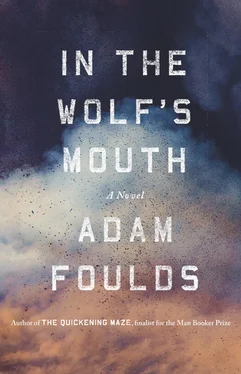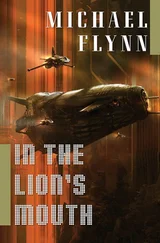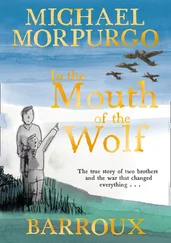AMGOT’s main task was what they were referring to as defascistification. The former rulers were rounded up and imprisoned, in part to prevent communication with the mainland, but many were disappearing into the crowds, burning their uniforms and becoming ordinary. Posters were put up calling for information and denunciations. Interviews with locals were arranged. Many denunciations arrived at the town hall handwritten and anonymous. Will and the others were told to find a certain individual who ‘has the eyes of a hypocrite’. Someone else could be identified because ‘he has a mortal fear of cats’. The local police forces were to remain in place, subserving the Allies, because there wasn’t time to replace them. They announced themselves loyal to the new government and thankful to be liberated from the Fascists — but who knew? They would have to be watched too. ‘The eyes of a hypocrite’ was a phrase that lodged itself in Will’s mind. He thought of it often, seeing them everywhere.
Cirò Albanese would not have recognised Alvaro Zuffo if he hadn’t been told it was him. Because he did know, however, he looked and slowly saw on the thin face of the old man the features of the person who had, enthroned in his heavy flesh, ruled over so much. Alvaro Zuffo had saved Cirò’s life but he himself had not left Sicily. He had refused to. Instead, he organised and exerted his power in any way he could. People were paid huge amounts of money. Others never woke up again. And all for nothing. The Fascists were not reasonable. They were fanatics with no business instinct. Alvaro Zuffo was arrested for nothing, for rumours and reputation, and he had spent years on a prison island. Cirò was not the only person who had told the Americans that he was one of the most important anti-Fascists they needed to release. Now Zuffo sat in an armchair in a suite in a Palermo hotel, smiling and shaking hands with old friends.
Cirò stared at him. Zuffo seemed surrounded by the ghost of his former flesh. Cirò’s memory kept adding it to the figure in front of him. Zuffo’s neck looked weak. His head trembled, his lips dark and loose. He kept them clamped together, a diagonal line across his face. He patted them with a handkerchief after he had spoken.
‘I never liked the sea,’ he said. ‘And I had to listen to it for years.’ He sipped from a small glass of red wine. ‘The things they did to me in there. Every day. Every day. They tie me to a box on the ground then one fits a gas mask over my head. It has a tube attached to a thing this other guy is holding full of sea water. He squeezes, the mask fills up. I’m drowning, I’m swallowing. I have to. Then they stop. One kicks me in the belly again and again and I puke up all the brine. I piss blood. I shit blood. When I find them …’
‘We’ll find them.’
‘And every night I could hear the fucking sea with it still stinking in my eyes and nose. Now I want to eat swordfish, I want to eat tuna. I want to eat every fucking fish and fuck the sea.’
Everybody laughed. Zuffo waved with his handkerchief and wiped his mouth.
Zuffo was a rich man again. American money had arrived with these men. They all brought tributes and tomorrow he would be a fine figure again, beautifully dressed. Some of the men Cirò had known in New York and New Jersey. Others were fellow prisoners. A few had escaped from a prison the other week when it was hit by a bomb. They described kicking through cracked and buckling walls and just walking out into a heavy air raid. ‘To me it was like rain in springtime,’ one of them said. ‘I was so happy.’
For once these men lost all reserve and spoke not in the old arcane figures of speech, and in hints and ellipses. Instead they chattered like schoolgirls about the possibilities ahead. The new currency that was coming in. The prostitution boom. The morphine market. Food shipments, transportation, the threat of Communism among the peasants, what they were telling the Americans, where certain Fascists had been spotted. They established where they all would be and who would speak to whom. There was much that they would do together. That was the talk in the room. The feeling was something different. Strange and wild, there was a feeling like love between them.
Walking through Palermo the following morning, through shouts and sunlight and strangers towards the docks to do some business, Cirò reflected that those men were better than family. They gave you more. And you knew how much you couldn’t trust them.
Having dealt with Silvio, Cirò had walked to his brother’s house in Sant’Attilio. They were all there. Cirò endured the explosion of recognition, of surprise and delight, sensing something else in the silences of each person who stopped talking and stepped back to allow another to come forward and embrace him. Unknown children ran around him. Some bare-arsed babies were carried in the arms of his nephews’ wives, his nephews who were men now. All this that he didn’t have — another thing that had been stolen from him. The grief of this as bitter as sea water. A glass of red wine was put in his hand.
Cirò’s brother was old now. He was still lean, still agile, but he also still had the same muddled, anxious look in his eyes. There was a fog inside. He was stupid and to compensate he made sudden, clumsy moves. He was a man who made mistakes. He took Cirò outside to smoke and said, ‘My boys, they haven’t been brought up in the old ways.’
‘Probably they’re too old to start now. Maybe they should go to America.’
Cirò’s brother tutted. ‘They can’t leave their families.’
‘Lots do. And send money back. I did. I had to. I did.’
Cirò’s brother nodded while ignoring this comment, thinking of something else, thinking of himself. ‘You could at least start teaching them how it all works.’
‘How what works? There’s nothing. I’ve only just got back.’
Cirò had no intention of giving anything to them. With their families they would make larger and larger claims for things they hadn’t earned. Cirò just needed a son of his own. He had often imagined one: handsome, taciturn, fearless, reliable.
Cirò turned a corner and saw at the end of the street a dazzle of sea light. That sight, it meant different things now. When he had left it had looked terminal, alien, the end of what he knew. It was where his world collapsed and dissolved. Now it looked familiar. It looked like work and stirred with possibility, particularly if he could be the first to negotiate this area of interest with Zuffo. The business would pay more than enough to give Zuffo his tribute. It would be something for Cirò to get in on this Palermo action but he could do it. The waterfront was busy with naval troops and was guarded. Cirò had to show his papers at a sawhorse barrier — military eyes on him, the card, on him again and waving him through — before he could go on to find two particular men who knew which ships were delivering the medical supplies.
In the chaos of the invasion, as it split and fissured across the island, Ray and Gem had somehow ended up separated from the others a long way east, and now they were a couple of days late for their destination.
They had lost the others in a small town that had rushed out, cheering, to greet the Americans. Sicilian men slapped their chests and declared, ‘My cousin — Chicago!’ Or ‘America best! Is best!’ And if one of the soldiers spoke a word of Italian to them, they threw their hands in the air with delight.
Ray was walking with Gem. Gem had close-set brown eyes, a prominent knob to his chin. When he sweated, his hair separated into little black spikes. He was not very military in his bearing. His uniform hung off a skinny body. His helmet looked on him like something picked up from a fancy dress store. When he saw something he liked, he looked around to share it with someone, beckoning them over with a scoop of his whole hand. He did this now, calling out to Ray, ‘Hey, Ray! Ray! Come and look at this!’
Читать дальше












